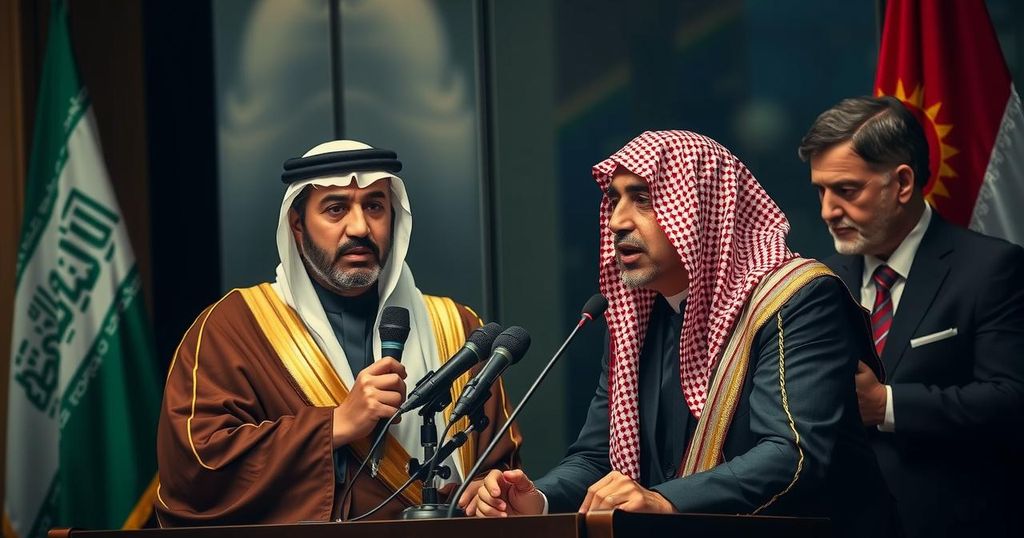Saudi Arabia and the UAE condemned Israel’s military strikes on Iranian targets, labeling them a breach of sovereignty and international law. This response follows prior missile launches from Iran towards Israel. Both countries emphasized the necessity for dialogue and restraint to address regional tensions, advocating for diplomatic resolutions over military confrontations.
Riyadh, Saudi Arabia, October 26 (ANI): Saudi Arabia and the United Arab Emirates (UAE) have jointly condemned the recent military strikes conducted by Israel on Iranian targets, deeming these actions a breach of both Iran’s sovereignty and international law, as reported by Gulf News. This condemnation follows an announcement from the Israel Defense Forces (IDF), which stated that it had executed “precise strikes” on military locations in Iran, occurring approximately a month after Tehran launched around 200 ballistic missiles aimed at Israel. The UAE expressed its deep concern over the escalating tensions and their potential ramifications on regional security and stability. The UAE’s Ministry of Foreign Affairs issued a strong statement imploring all parties to exercise maximum restraint, underscoring the critical need to avoid actions that might exacerbate the conflict. The statement asserted, “exercising wisdom and avoiding actions that may expand the conflict are crucial at this time.” Furthermore, the Emirati foreign ministry reaffirmed the stance that dialogue, conformity with international law, and respect for state sovereignty are vital for resolving ongoing crises, advocating for peaceful diplomatic solutions over confrontation. On its part, Saudi Arabia reiterated its commitment to resisting further regional escalation and the deepening of conflicts that threaten the safety and stability of regional nations and their populations. The Kingdom called on all parties involved to demonstrate restraint and work collaboratively towards de-escalation. Saudi Arabia also urged the international community and influential actors to play an active role in mitigating tensions and resolving disputes in the area. In light of the heightened violence, recent incidents have claimed the lives of at least 1,200 individuals, with 252 Israelis and foreign nationals taken hostage during Hamas’s attacks on Israeli communities near Gaza on October 7 last year. According to local health authorities in Gaza, approximately 42,000 people have reportedly died due to Israel’s military response. Qatar, acting as a mediator in efforts to bring an end to the Gaza conflict, voiced its deep concern regarding the serious consequences that may stem from Israel’s escalation. Additionally, Oman, known for its mediating role between Iran and Western countries, stated that Israel’s aggression “fuels the cycle of violence and undermines efforts” for de-escalation, urging the international community to put a stop to such violations of neighboring countries’ territories. Kuwait’s foreign ministry likewise condemned the actions of Israel, asserting that they pose a threat to regional security.
The recent military strikes by Israel on Iranian targets have generated significant regional condemnation, particularly from Saudi Arabia and the UAE. Israel’s military actions were framed as retaliatory measures following missile attacks from Iran. The sensitive geopolitical landscape of the Middle East, marked by longstanding tensions and alliances, is significantly impacted by these developments, highlighting the precarious balance of security and diplomacy in the region. The reactions from other Gulf States, including Qatar, Oman, and Kuwait, further illuminate the regional anxiety over escalating military conflicts and the overarching need for dialogue and restraint.
In conclusion, the military actions taken by Israel against Iranian targets have sparked widespread condemnation among various Middle Eastern nations, including Saudi Arabia and the UAE. The responses highlight regional concerns regarding sovereignty, security, and the need for diplomatic engagement to resolve conflicts. As tensions escalate, the calls for restraint and international intervention underscore the critical role of dialogue in mitigating further violence and promoting stability in the region.
Original Source: www.aninews.in







